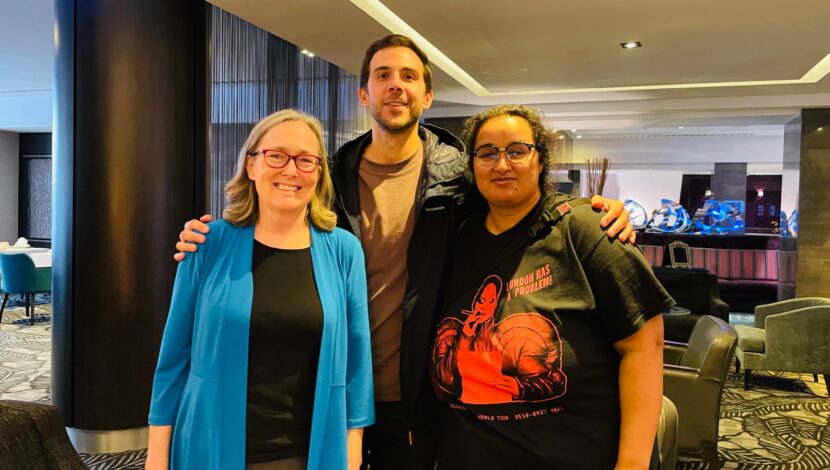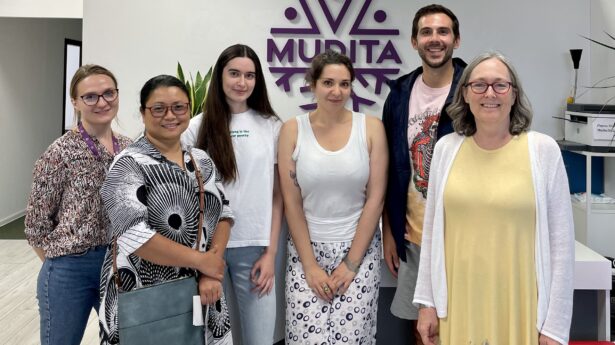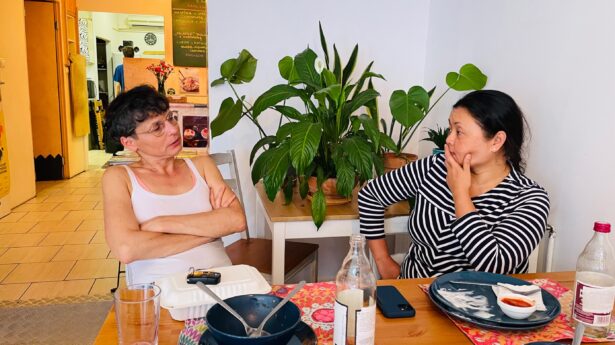The Unitarian Universalist Service Committee advances human rights through grassroots collaborations.
Visiting Eastern Europe’s Grassroots Organizations: Responding to Community-Identified Needs (Part 2)

By Michael Kourabas on October 2, 2023
Russia’s full-scale invasion of Ukraine in February 2022 has taken the lives of and displaced thousands. As the war between the two nations continues, UUSC has a steadfast commitment to not only providing first response aid to those who have been displaced and other survivors, but also to addressing the medium- and long-term ramifications of this conflict. UUSC staff traveled to Poland—where many have fled Ukraine in the wake of the invasion—for an informative update on the situation on the ground involving its partners and to learn what issues are still impacting the people of Ukraine and what we can be doing to advance justice and equity in the region in the long term. Read the first blog in the series here.
I and two of my colleagues, Senior Partnership Officer for International Justice and Accountability Myra Dahgaypaw and President Reverend Mary Katherine Morn, traveled to Eastern Europe to meet with grassroots leaders to learn about the real-life impacts of Russia’s war with Ukraine and how our partners are showing up for those most in need.
Our partners are facing various challenges. Funders are backing away as refugee relief is no longer viewed as a top issue to resource. Many refugees will not be able to return to Ukraine in the near future—if at all. There is a dire need for funders to provide long-term funding that allows our partners to respond immediately to crises and support long-term needs.
Even amidst the challenges, there is hope. Thankfully, UUSC grants have made a significant impact. Here’s how we’ve been able to respond to the needs identified by those communities facing oppression in Eastern Europe:
Responsive and Flexible Funding
Civil society organizations need more resources. When funding was more abundant at the onset of the invasion in 2022, several of our partners on the ground scaled up their operations to meet the widespread needs they were encountering. This increased support is not sustainable, however, if those resources disappear.
Queer Svit, a Black, queer-led organization, faces unique challenges—namely, finding funders who support helping BIPOC, LGBTQ+ people fleeing Russia.
Co-founder Anna-Maria Tesfaye said that UUSC is the organization’s largest funder and the resources we provided came in at a critical time and gave staff the confidence they need to move forward.
UUSC partner Mudita shared the same sentiment. The flexibility of our grant felt like a lifeline, according to the staff that work there.
The lack of bureaucracy and red tape provided by UUSC funding allows organizations to continue operating and address needs in real-time.
Long-Term Commitment
Long-term funding is crucial to aiding refugees in Poland—and any locale housing those who have been displaced. Many nonprofits devote a substantial amount of resources to support the needs of refugees at the onset of a displacement crisis. While many funders respond at the beginning of these crises, within one to two years, those funds often dry up, with funders moving on to other issues. UUSC’s commitment to long-term recovery ensures that the groups on the ground who need funding for extended periods can access the resources they need.
We met with RegenerAction’s full-time staff members, Julia and Natalia, in Warsaw, Poland. The organization is the only one in Poland that focuses on activist burnout, rest, and recovery. Stable funding from UUSC allows RegenerAction to continue providing these vital services, helping advocates, activists, and organizers replenish and rejuvenate as they work long hours and serve the many needs of those who have been displaced.
In addition to maintaining longer-term support, UUSC still maintains the Emergency Response Fund. Donations to the fund help our partners respond to crises as they occur while providing sustained support. The fund especially aids oppressed communities—in Poland and Ukraine—that includes members of the Roma community, women, BIPOC, LGBTQ+ people, and those in rural areas.
Addressing Short-Term Needs While Supporting Long-Term Recovery
Since many Black people will remain in Poland for the foreseeable future, the Alliance for Black Justice in Poland (ABJP) provides networking and community-building events to help build a sense of community for people of color living in the country. A sense of belonging is important to Black refugees who experience the trauma of war, being away from their homes, and being disconnected from Black communities.
Joy is the first staff person clients meet when accessing direct services through ABJP.
“Many people feel like [ABJP] is their home,” she said. “We’re the only people they can trust.”
UUSC funding equips ABJP to tackle these and other short-term needs while providing long-term support.
In addition to working to change the xenophobic narrative about the Roma and improve relationships between the Roma people and other groups in Ukraine, the Youth Agency for the Advocacy of Roma Culture (ARCA) has also provided Roma people displaced by the war with humanitarian assistance since the full-scale invasion. ARCA’s long-term aim of countering anti-Roma oppression in Ukraine means transforming negative stereotypes about the Roma people while ensuring they have opportunities to thrive in a post-war Ukraine. ARCA hopes this vital work will ensure that the Roma people have sustained access to services and resources while addressing their immediate needs.
UUSC’s commitment to the communities most impacted by injustice takes a deeper view of the issues beyond immediate direct response. The institution’s commitment to understanding systems and structures fuels its work to ensure that root causes are addressed, rather than merely providing immediate relief and then vacating these relationships. A sustained relationship over time is key to ensuring that these organizations have the resources they need not only to help in the direct aftermath of a crisis, but also to rectify problems that are systemic and structural in nature—problems that cannot be resolved in one or two years.
Image Credit: UUSC

